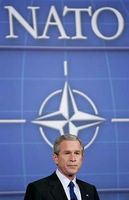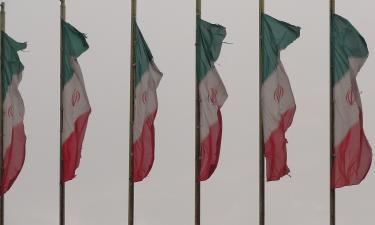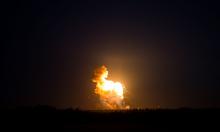NATO: too much fuss and petty achievements
Now it is becoming clear that cooperation between Russia and NATO in the fight against terrorism is fruitless
North Atlantic Treaty Organization has to change its tactics following the political demarche by the Shanghai Cooperation Organization during the summit in the Kazakh capital Astana earlier this July. The member states and observers of the Shanghai Cooperation Organization supported Uzbekistan's proposal and demanded that NATO pull out its military bases from Central Asia. Moreover, the Shanghai Cooperation Organization requested that NATO set a deadline for the removal of troops. The statement actually threatens the implementation of decisions taken at last year's NATO summit in Istanbul which declared a larger part of Central Asia (along with the Caucasus) a zone of strategic interests of the Alliance. 
NATO is likely to shift its efforts to the Caucasus. According to vice president of the Academy of Geopolitical Studies Col. Gen. Leonid Ivashov, NATO's rapid deployment military installations will be set up in Georgia and Armenia when the Russian military bases are finally squeezed out of those countries. The installations will be properly equipped and manned by personnel capable of conducting a large-scale troop and equipment deployment within several hours. The Alliance is trying to build a new bloc of states comprising Turkey, Georgia, and Azerbaijan. Col. Gen. Ivashov believes that Azeri President Ilham Aliev has come under pressure because the Americans want his go-ahead on the lease of three air fields in Azerbaijan.
More importantly, NATO is going to focus on Ukraine whose political elite have eyes for Europe. Back in 2002 Ukrainian Parliament passed a bill allowing NATO to use the whole territory of Ukraine for deploying its troops including units with heavy equipment. The NATO Big Black Sea Zone program specifically says that naval bases, onshore facilities etc. should be developed. Patriotism-conscious Russian politicians and political scientists are very much concerned about the above situation. They believe that Ukraine may end up dismembered into three states at the very least should it continue following the present political course. The borders of those states would be defined by confrontation between the west and the east and instability of the Crimea. “They can only allow parts of Ukraine to join Europe if they ever agree to let it in,” has been saying Col. Gen. Ivashov to his opponents. The Russian naval base on the Crimean coast may be shut down due to the developments in Ukraine. Despite the fact that the Russian Navy is to use the base up to 2017 in compliance with the bilateral agreement, Ukraine will never integrate into NATO as long as the Russian Black Sea Navy is based in Ukraine.
After the West was accused of instigating the “color revolutions” and the recent demands by the Shanghai Cooperation Organization with respect to the withdrawal of NATO military bases from Central Asia, Russia tends to recall its previous experiences of dealing with NATO, the experiences characterizing NATO as an inconsistent organization which can not keep its promises. Russia insisted that the Russia-NATO Basic Act should contain a clause effectively banning the deployment of nuclear weapons in the newly integrated member states of the Alliance. However, NATO's stance on the issue eventually prevailed and the clause vaguely stipulated something like “the parties have no intentions.” Now it is becoming clear that cooperation between Russia and NATO in the fight against terrorism is fruitless. “Can you show me any bandit captured by a joint effort?” asks Col. Gen Ivashov. “There is none and we should not expect any results since 85% of the NATO activities boil down to “improving combat readiness, conducting defensive and offensive operations on land and by air,” adds he.
Col. Gen. Ivashov believes that cooperation between Russia and NATO is a waste of time.
The Alliance is accused of “concept aggressiveness.” Analysts cite the NATO Secretary General Jaap de Hoop Scheffer who made a statement prior to his visit to Moscow in June this year. In the statement he said that protection of democracy by taking appropriate steps including military operations, should the latter be deemed necessary, was the main objective of the Alliance. Analysts also call into question the worthiness of joint military exercises. Historical parallels are drawn yet again in proof of the point of view. The NATO leadership was convincing the Russian government in 1998-1999 that military exercises in the vicinity of Yugoslavia would not evolve into hostilities. Eventually, the story unfolded in a different way. The NATO forces were ordered to detect and destroy a terrorist submarine during the military exercises code-named Baltops. Can you imagine any other subs but the Russian ones that could be detected in the Baltic Sea?
Incidentally, Russia is not taking part in the military exercises Peace Shield 2005 that went under way yesterday in Ukraine. The first stage of the exercises involves about 750 servicemen from 22 countries conducting computer-simulated combats based on a real military and political situation in Iraq. The international contingent will move from Kiev to the Crimea on July 25th. The maritime stage of the exercises will take place from August 3rd to August 13th.
At times the politicalorientation and scenario of Peace Shield exercises were apparently anti-Russian. Here is an example of the scenario. Riots break out in the Crimea and one of the countries provides help to the Russian-speaking part of the population. It is clear that Russia is the only country which could rise to the occasion. The present exercises also include “missions relating to an international peacekeeping operation aimed at making peace.” That is possibly why Russia refused to take part in the exercises.
On the other hand, there are people in Russia who have a different opinion on “alliance between Russia and the Alliance.” President of the Institute of Strategic Analysis Alexander Konovalov believes that the most terrible thing conceivable has happened to NATO. The Alliance lost its mission and its enemy. These days NATO is on a frantic search for new forms of identity. However, the Alliance is not scoring great success in the fight against the proliferation of weapons of mass destruction, terrorism, drugs trafficking, and illegal immigration. The U.S. does not conceal its discontent because NATO is making too much fuss while making too little progress. Mr. Konovalov is confident that the NATO member states are not ready to join forces and defend the Baltic countries. Even though the relocation of NATO military bases to Eastern Europe looks like a clear threat to Russia, it is mostly a matter of cost effectiveness. It is a lot cheaper to keep the bases in Poland and Bulgaria than in Germany. Alexander Konovalov arrives at the conclusion that NATO poses not threat to Russia.
Subscribe to Pravda.Ru Telegram channel, Facebook, RSS!





